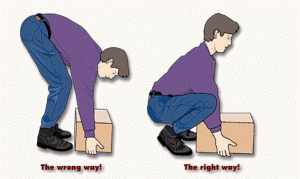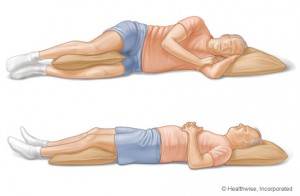Shoulder pain has a way of creeping into nearly every part of daily life. Simple movements — like reaching into a cabinet, fastening a seatbelt, getting dressed, or even finding a comfortable sleeping position — can suddenly become frustrating or downright painful....
Sleep plays a vital role in healing, recovery, and overall well-being. Unfortunately, hip pain can make getting a full night’s rest feel nearly impossible. Tossing and turning to find a comfortable position, waking up from sharp or aching pain, or starting the morning...
If you are struggling with lower back pain that radiates down your leg, you might have hit the internet searching for answers, only to find the terms “sciatica” and “herniated disc” discussed frequently. This is because both conditions can cause debilitating back...
5 Tips to Keeping Your Spine Healthy

“Sit up straight!”
For hundreds of years, those three words were the only spine health advice most people ever received. Occasionally, they heard the corollary, “Don’t slouch.”
While those are still words to live by, care of the spine has evolved well beyond good posture and lumbar support car seats.
Remember that your spine is part of your central nervous system and not just a backbone.
Follow these helpful tips for optimum spine health, and keep them in mind throughout the day because your spine is always on duty:
Mind Your Spine When Lifting Heavy Items
Everyone says you can injure your back if you lift heavy items, and you should listen to them. Orthopaedic doctors confirm that approximately 85% of the population suffers from spinal pain at some point; the other 15% have probably never tried to lift anything heavy.
The worst thing you can while lifting is twist. Twisting is the most harmful movement for your spine, and twisting your body while lifting makes it twice as dangerous.
If the object is too heavy to lift, avoid pulling it. There is less strain on your back if you push it, and you should use your legs to push rather than your back or upper body.
The best advice is to get someone to help you with overweight items. Is it worth a lifetime of back pain just to get some box out of the way?
Be Careful When Bending and Reaching
When picking up something from the floor, never bend at the waist to reach for it; instead get as close to the object as you can by kneeling down on one knee, and pick it up slowly. Even better, you should bend at the knees and lift with your legs.
If you must reach for an item that is higher than your shoulder, use a stool. If you strain to reach for something on a high shelf, you may injure your neck and shoulders, as well as your back.
Sitting and Standing Properly Is Key
Always stand with one foot slightly in front of the other to take the strain off your lower back. Don’t lean forward for long periods of time, as this will weaken your lower back muscles and likely lead to pain.
Be kind to your spine if you must sit for hours at a time. Keep your head up and your shoulders back, and don’t forget what your Mom told you: sit up straight!
Let Your Spine a Good A Get Night’s Rest
You spend about a third of your life sleeping, so give your spine a rest in bed and avoid sleeping on your back. Whenever you lie on your back, place a pillow under your knees, which will greatly ease the pressure on your spine.
Most people sleep on their sides, a healthy position for your back if you keep a firm pillow between your knees as you drift off to sleep. If you experience any back or neck pain in bed, change positions immediately.
Maintain a Healthy Diet And Exercise Regimen
If you’re overweight, your spine has to work harder, so the closer you are to your ideal weight the less pressure there is on your back. The biggest strain on your lower back is a paunch, so lose the potbelly before it damages your back muscles, ligaments and tendons.
A proper exercise routine will not only strengthen your back, but also help you lose weight. However, before beginning any exercise program be sure to consult with an orthopaedic doctor, particularly if you’ve had back problems in the past.



